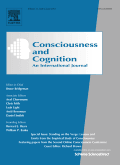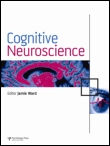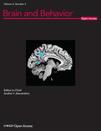
CONSCIOUSNESS AND COGNITION
Scope & Guideline
Bridging Theory and Empirical Research in Cognition
Introduction
Aims and Scopes
- Consciousness Studies:
Explores various aspects of consciousness, including its definition, characteristics, and implications in cognitive science, psychology, and philosophy. - Cognitive Processes:
Investigates how cognitive processes such as perception, memory, attention, and decision-making interact with conscious experience. - Neuroscience of Consciousness:
Examines the neural correlates of consciousness, utilizing neuroimaging and electrophysiological techniques to understand brain mechanisms underlying conscious awareness. - Metacognition:
Focuses on the awareness and regulation of one's own cognitive processes, including how individuals monitor their thoughts and beliefs. - Dream and Altered States of Consciousness:
Investigates the nature of dreams, lucid dreaming, and other altered states of consciousness, including their cognitive, emotional, and neurological underpinnings. - Interdisciplinary Approaches:
Encourages contributions from various disciplines, including psychology, neuroscience, philosophy, and artificial intelligence, fostering a holistic understanding of consciousness.
Trending and Emerging
- Neural Mechanisms of Consciousness:
There is an increasing focus on elucidating the specific neural mechanisms that underlie consciousness, with research employing advanced neuroimaging techniques to explore brain activity associated with conscious experiences. - Mindfulness and Consciousness:
Studies investigating the effects of mindfulness practices on consciousness and cognitive processes are gaining traction, reflecting a growing interest in how mindfulness can influence awareness and cognitive flexibility. - Artificial Intelligence and Consciousness:
Research exploring the implications of artificial intelligence for understanding human consciousness is emerging, particularly in how AI systems can model cognitive processes and what this means for theories of consciousness. - Aphantasia and Mental Imagery:
The phenomenon of aphantasia—difficulty in visualizing mental images—has become a hot topic, leading to investigations of its cognitive implications and its relationship with consciousness and creativity. - Interoception and Body Awareness:
Emerging studies are increasingly focusing on the role of interoception (awareness of internal bodily states) in consciousness, exploring how bodily awareness influences cognitive processes and emotional regulation.
Declining or Waning
- Traditional Theories of Consciousness:
Earlier papers often focused on classical philosophical theories of consciousness. However, there has been a shift towards empirical and interdisciplinary approaches, leading to a decline in purely theoretical discussions. - Simple Behavioral Studies:
Research centered on basic behavioral experiments with limited cognitive or neural implications has waned, as the journal increasingly favors studies with deeper insights into cognitive mechanisms and neural correlates. - Overreliance on Self-Report Measures:
Papers relying heavily on subjective self-report measures without robust experimental designs are becoming less common, as the field moves toward more objective and quantifiable methodologies. - Static Models of Cognition:
The focus on static models that do not account for dynamic cognitive processes and interactions has decreased, with a growing emphasis on dynamic and integrative models that better capture the complexity of cognition.
Similar Journals

PHILOSOPHY AND PHENOMENOLOGICAL RESEARCH
Fostering Scholarly Discourse in PhenomenologyPHILOSOPHY AND PHENOMENOLOGICAL RESEARCH, published by Wiley, stands as a premier journal within the realms of Philosophy and the History and Philosophy of Science, boasting an impressive Q1 ranking in both categories as of 2023. With the ISSN 0031-8205 and E-ISSN 1933-1592, this esteemed journal has been a pivotal platform for philosophical inquiry since its inception in 1970. Dedicated to advancing understanding in phenomenology and its implications across various disciplines, the journal encourages scholarly discourse through high-quality peer-reviewed articles that explore both classical and contemporary philosophical thought. With a Scopus ranking of #46 in Philosophy and #20 in the History and Philosophy of Science, PHILOSOPHY AND PHENOMENOLOGICAL RESEARCH operates at the confluence of rigorous academic investigation and innovative ideas, making it an indispensable resource for researchers, professionals, and students alike. As part of its commitment to facilitating scholarly communication, the journal does not currently offer open access but ensures accessibility through various institutional subscriptions. Discover the rich tapestry of philosophical inquiry that shapes our understanding of the world in its pages.

Phenomenology and the Cognitive Sciences
Illuminating the Pathways of Consciousness and KnowledgePhenomenology and the Cognitive Sciences is a leading interdisciplinary journal published by Springer, dedicated to exploring the intersections of cognitive science and phenomenological philosophy. Since its inception in 2004, this journal has established itself as a vital resource for researchers and scholars, achieving Q2 status in Cognitive Neuroscience and Q1 in Philosophy according to the 2023 Category Quartiles, highlighting its significance in both fields. With an ISSN of 1568-7759 and an E-ISSN of 1572-8676, the journal provides a platform for innovative research, fostering insightful dialogues that bridge the gaps between cognitive processes and human experience. Its current Scopus rankings place it in an impressive 97th percentile for Philosophy and 59th percentile for Cognitive Neuroscience, reflecting its academic impact. Although not an open-access journal, researchers and students can access its rich repository of articles to deepen their understanding of how cognitive science informs philosophical inquiry and vice versa, making it an indispensable tool for anyone committed to advancing knowledge in these vital areas.

RESEARCH IN PHENOMENOLOGY
Illuminating the Essence of ConsciousnessRESEARCH IN PHENOMENOLOGY, published by BRILL, stands as a vital academic journal dedicated to the exploration of phenomenological research within the realm of Philosophy. With an ISSN of 0085-5553 and an E-ISSN of 1569-1640, this journal has been a respected platform since its inception, reflecting a rich history spanning from 1971 to the present. Despite not currently offering open access, it provides invaluable insights and scholarly articles that contribute significantly to the understanding of phenomenology and related disciplines. The journal holds a prestigious Q3 ranking in the 2023 category of Philosophy, with a Scopus ranking of 409 out of 806 in Arts and Humanities, indicating a solid standing in academic discourse. Academics, researchers, and students alike are encouraged to engage with the cutting-edge studies published in this journal, which serves as an essential resource for advancing phenomenological thought and fostering interdisciplinary dialogue.

PHILOSOPHICAL STUDIES
Advancing the Frontiers of Philosophical ThoughtPhilosophical Studies, published by Springer, is a prestigious peer-reviewed journal that stands at the forefront of philosophical discourse since its inception in 1950. With ISSN 0031-8116 and E-ISSN 1573-0883, this journal has firmly established itself as a critical platform for disseminating high-quality research in philosophy, positioned in the Q1 category for Philosophy with an impressive Scopus rank of #73 out of 806, placing it in the 90th percentile of its field. Although it does not offer Open Access, the journal’s rigorous selection process ensures that only the most relevant and impactful studies are published, making it an invaluable resource for philosophers, academics, and students alike. With a commitment to advancing philosophical inquiry and fostering a vibrant scholarly community, Philosophical Studies continues to attract contributions that challenge prevailing paradigms and explore new dimensions in philosophical thought. The journal's scope encompasses a wide array of topics within philosophy, encouraging interdisciplinary engagement and dialogue.

JOURNAL OF CONSCIOUSNESS STUDIES
Unraveling the Mysteries of Consciousness Through Research.JOURNAL OF CONSCIOUSNESS STUDIES, published by IMPRINT ACADEMIC, is a leading multidisciplinary platform dedicated to the exploration of consciousness, philosophy, and cognitive science. Established in 1996, this journal has garnered recognition within several academic categories, achieving a 2023 Q1 classification in Philosophy and a Q2 ranking in Psychology and Ecology, among others. With an emphasis on innovative perspectives and interdisciplinary research, the journal aims to foster dialogue among researchers, professionals, and students who share a keen interest in understanding the complex nature of consciousness and its implications across various fields. Though it does not operate under an open access model, the journal provides comprehensive content that is vital for advancing scholarly discourse. With significant influence reflected through its Scopus rankings and a commitment to high-quality research, the JOURNAL OF CONSCIOUSNESS STUDIES remains an essential resource for those engaged in the ever-evolving study of consciousness.

Cognitive Neuroscience
Exploring the Neural Tapestry of ThoughtCognitive Neuroscience is a pivotal journal in the ever-evolving field of cognitive neuroscience, published by Routledge Journals, Taylor & Francis Ltd, in the United Kingdom. Since its inception in 2010, this journal has dedicated itself to publishing innovative research that explores the intricate relationships between neural mechanisms and cognitive processes. With an increasing focus on interdisciplinary studies, it addresses critical issues from both theoretical and empirical perspectives. Although it currently holds a Q3 ranking in the Cognitive Neuroscience category, it has made significant strides in its Scopus ranking, now positioned at #62 out of 115, reflecting its growing impact on the academic community. Researchers and professionals will find the journal an invaluable resource for staying updated on the latest findings and methodologies in the field. While the journal operates under a traditional access model, it ensures high visibility and dissemination of crucial research that shapes our understanding of the brain's role in cognition. As it continues to evolve through to 2024, Cognitive Neuroscience remains committed to fostering collaboration and inspiring future innovations within the discipline.

ANTHROPOLOGY OF CONSCIOUSNESS
Advancing Understanding of Cognitive Dimensions in AnthropologyAnthropology of Consciousness is a prestigious journal published by Wiley, focusing on the intricate ties between consciousness and anthropology. With its ISSN 1053-4202 and E-ISSN 1556-3537, this journal has established itself as a key platform for scholars investigating the cognitive, cultural, and experiential dimensions of consciousness. Operating since 1990 and with converged years extending to 2024, it has achieved a commendable Q2 ranking in Anthropology for 2023, reflecting its significance in the field. Although it is not an open-access journal, it provides robust access options through various university and library subscriptions. The journal aims to disseminate high-quality research and foster interdisciplinary dialogue among researchers, professionals, and students interested in the anthropological aspects of consciousness. With its address located at 111 River St, Hoboken 07030-5774, NJ, United States, it continues to be a vital resource for those exploring the depths of human experience.

Physics of Life Reviews
Charting New Territories in Interdisciplinary ResearchPhysics of Life Reviews is an esteemed journal published by ELSEVIER, focusing on the interdisciplinary study of life sciences through the lens of physical principles. Since its inception in 2004, the journal has garnered considerable recognition, achieving a remarkable impact factor that underscores its significance—ranking in the top quartile (Q1) across three distinct categories in 2023, including Agricultural and Biological Sciences, Artificial Intelligence, and Physics and Astronomy. These exceptional rankings highlight the journal's commitment to advancing research and fostering innovation in the application of physical concepts to biological systems. Physics of Life Reviews provides comprehensive reviews, critical analyses, and cutting-edge insights that are essential for researchers, professionals, and students seeking to navigate and contribute to this dynamic field. As an essential resource, the journal encourages the exploration of new paradigms and methodologies, facilitating the growth of knowledge at the intersection of physics and life sciences.

Brain and Behavior
Pioneering the Future of Behavioral Neuroscience.Brain and Behavior is a premier open-access journal published by WILEY, dedicated to advancing the field of Behavioral Neuroscience. With its ISSN 2162-3279, the journal has established itself as a vital resource for researchers, professionals, and students alike, fostering the dissemination of cutting-edge research since its inception in 2011. Renowned for its rigorous peer-review process, it enjoys a commendable Q2 ranking within the field, reflecting its impactful contributions and relevance in the scientific community. The journal not only emphasizes innovative studies that bridge behavioral science and neuroscience but also serves as a platform for diverse methodologies and interdisciplinary approaches. Accessible [open access](https://onlinelibrary.wiley.com/journal/21623279), Brain and Behavior invites submissions that explore the neural mechanisms underlying behavior, aiming to engage a global audience eager to expand the boundaries of knowledge in this dynamic field. Positioned in the heart of the United States, at 111 River St, Hoboken, NJ, it is strategically placed to collaborate with leading institutions and researchers worldwide.

Filosofskii Zhurnal
Fostering Interdisciplinary Dialogue in the HumanitiesFilosofskii Zhurnal, published by the esteemed Russian Academy of Sciences - Institute of Philosophy, is a renowned academic journal focused on the vibrant fields of Philosophy, Cultural Studies, History and Philosophy of Science, and Linguistics. With an ISSN of 2072-0726 and an E-ISSN of 2658-4883, this esteemed publication has been a pivotal source of scholarly discourse since its inception in 2019, with converged years extending through 2024. Holding a distinguished Q2 quartile ranking in several disciplines, the journal is instrumental in advancing knowledge and research within its realms, making significant contributions to the understanding of philosophical thought, cultural dynamics, and language interpretation. Although it does not currently offer open access options, the journal maintains a strong presence in Scopus with notable rankings, including its position at #490/806 in Philosophy and #837/1304 in Cultural Studies. By providing a platform for original research, critical reviews, and interdisciplinary dialogue, Filosofskii Zhurnal serves as a valuable resource for researchers, professionals, and students seeking to deepen their understanding of philosophical inquiry and related fields.